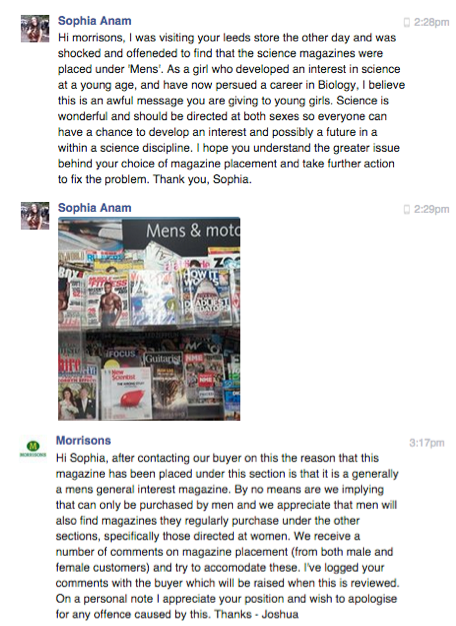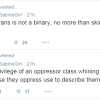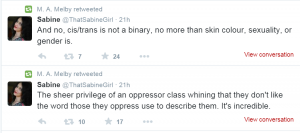Last year glosswitch wrote 9 reasons why “cis” isn’t working.
1 Cis is not a necessary alternative to trans
Many people find it hard to see what is wrong with this statement:
But what if someone said this:
“anyone not Muslim is Christian”
It doesn’t make any sense, does it? The fact that being a Muslim is predicated on having a religious belief does not mean that anyone who is not a Muslim must have a different religious belief, let alone one specified by you.
She’s framing “cis” as a belief about gender, part of a belief system about gender. The point is, not everyone buys into that belief system. We don’t have to, and many of us don’t. It’s not our belief system.
There is quite clearly something missing: the space for people who do not wish to be defined by these belief systems at all. In the case of the former statement, that would be a huge number of feminists, with good reason.
I am not religious. I don’t define myself as an atheist any more than I define myself as a “not believer in fairies”. I just don’t wish to define myself in relation to religion in any way, shape or form. Does it mean I don’t believe Muslims are Muslims? Of course not. Similarly, does not identifying as cis mean I don’t believe trans people are trans? Clearly not. Nor does it mean that I am agender (I am female and I am a woman. Gender does not come into it). An absence of belief is not the erasure of someone else’s. On the other hand, the demand that someone actively endorses your worldview by declaring themselves a believer or risk being deemed a bigot and subjected to ongoing threats and abuse … well, what would you call that?
An absence of belief is not the erasure of someone else’s.
That’s such an important point.
2 It’s morally unacceptable to demand that another person swears allegiance to a belief system they experience as harmful
This is what is being done when feminists who do not believe in gender as anything other than a construct are ordered to identify as cis. It is not merely unfair; it is cruel, a cruelty which is intensified when the consequences of not submitting are to be declared a hateful bigot and a TERF.
And expelled and ostracized from all decent society.
3 Individuals should have the freedom to identify with any gender – or none
This is linked to the previous two points and it is that basic: to be cisgendered has no meaning to someone who does not experience themselves as gendered in any way other than by the gaze of others.
That. It’s nothing to do with stuffing a sock down your jeans, it’s to do with who you are to yourself as opposed to the gaze of others.
In a recent piece for the Guardian, Fred McConnell described gender as “one’s innate sense of self”. I don’t know what this means. This does not mean I am deficient or ignorant. It means I don’t think that’s what gender is. Hence when McConell says “cisgender […] refers to those whose sex and gender do match” I am 100% sure that I am not cis. I don’t experience this matching but nor do I experience a sense of allegiance with any other gender construct.
My “star sign” is Aries, but that means nothing to me, and it wouldn’t mean any more to say my “star sign” is Leo. There is no match between my sense of myself and any star sign, because I don’t believe in astrology.
4 Trans women should not depend on non-trans women for self-definition
Why the hell should they even want to? My not-cis-ness says nothing about your trans-ness. You don’t need me as a foil to offer validation. You are your own person.
And I’m my own person. I reject the claim that my sex and gender match, but that doesn’t mean I think nobody is either cis or trans.




